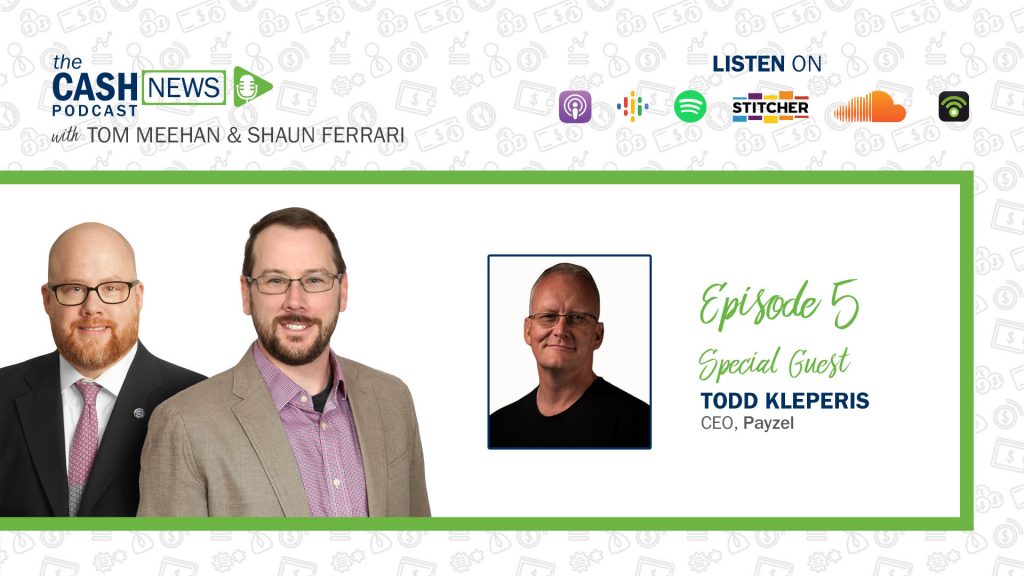
In the latest episode of The Cash News, Tom and Shaun are joined by Todd Kleperis, founder of HARDCAR and Payzel, to discuss how the right mix of transport and security keeps the billion-dollar cannabis industry moving. As the first company to legally move cash in the state of California, HARDCAR has moved over $3 billion dollars through the Federal Reserve, and Kleperis brings an invaluable wealth of knowledge in the protection, movement, and financing of cash in the fledgling and ever-evolving cannabis industry.
According to recent data published by New Frontier Data, annual legal (medical and adult-use) sales of cannabis are set to grow at a compound annual growth rate (CAGR) of 21% to reach more than $41 billion by 2025 (up from $13.2 billion in 2019). The biggest challenge is that the average value of product that needs to be transported is around $200 or more per ounce, so the safe and discreet transport of cannabis currency is risky, to say the least.
On the front end, HARDCAR is a self-sustaining transportation company that secures the transportation of money, and like most serial entrepreneurs, Kleperis quickly identified a gap in this cash-heavy industry and sought to bring out the lending side of the cannabis industry. The brainchild of this innovation became Payzel.
With a lot of new legislation coming down the pipeline, the government is making strides towards federal legalization, but as Kleperis points out, there are numerous nuances that go along with this movement. For instance, if the SAFE Banking Act of 2021 (a bill passed by the House on April 19, 2021 that generally prohibits a federal banking regulator from penalizing a depository institution for providing banking services to a legitimate cannabis-related business) were to go to fruition today, Kleperis estimates the U.S. is still two to three years away from the bigger banks stepping their foot in it, not only in terms of reputational risk but also the risk in taking on an industry like cannabis like is completely new to traditional financial institutions.
Like other businessess such as pawn and gun shops, it will be hard to move cannabis toward being fully “banked” with more mainstream financial services like commercial banking. However, the idea that there are few to no banks that work with cannabis businesses is a misconception. In fact, there are plenty of financial institutions that work in the cannabis space, including 18 banks and growing in Payzel’s network. However, banks must advertise themselves while also meeting often costly compliance regulations required to manage money for an industry that is still not legal on the federal level.
Another obstacle for financial institutions that want to work with cannabis companies is the issue of trust. While Kleperis has only recently started banking cannabis companies with Payzel, HARDCAR has been moving their cash for years, so transitioning from cash transport to commercial banking services wasn’t as big of a leap. Banks, credit unions, and other financial institutions that want to work in the cannabis space should prioritize building relationships with cannabis companies to earn their trust.
As more banks, credit unions, and other financial services start to work with cannabis companies, the cost of banking with traditional financial institutions becomes much lower for these organizations, like growers and dispensaries, both medical and recreational. Furthermore, this helps to destigmatize people who work in the cannabis industry, who could be denied personal financial services like home loans in states where cannabis use is not legal.
Over the past year, Kleperis has noticed that more and more people have started using cannabis, which has led tax revenue in states like Colorado, Oregon, and California to increase drastically, contrary to some assumptions that cannabis spending would decrease during the COVID-19 pandemic. We are also seeing more banks accept and trade in cryptocurrency, which has long played a role in the cannabis industry for its encrypted, virtually anonymous transactions.
In this episode, Todd, Tom, and Shaun also discuss future state and federal legislation, the numerous nuances in product, regulations, and compliance programs, along with how other industries such as autonomous vehicles, hydrogen-powered trucks, and solar-power walls are getting involved with Payzel, which seeks to bank more companies and move cash off the streets.


